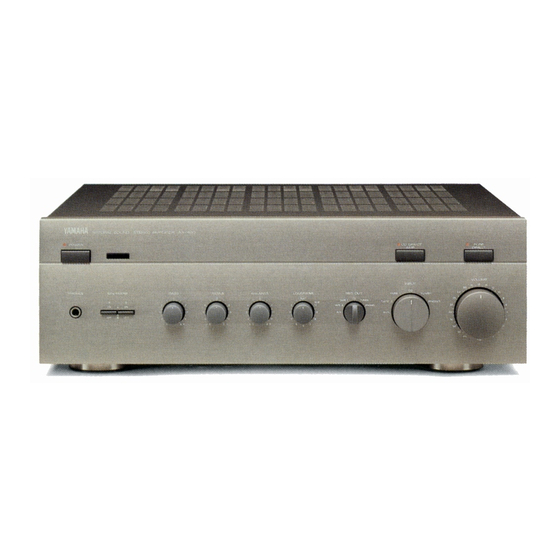Yamaha AX-590 Owner's Manual - Page 2
Browse online or download pdf Owner's Manual for Amplifier Yamaha AX-590. Yamaha AX-590 15 pages. Natural sound stereo integrated amplifier

SAFETY INSTRUCTIONS
1
Read Instructions – All the safety and operating
instructions should be read before the unit is operated.
2
Retain Instructions – The safety and operating instructions
should be retained for future reference.
3
Heed Warnings – All warnings on the unit and in the
operating instructions should be adhered to.
4
Follow Instructions – All operating and other instructions
should be followed.
5
Water and Moisture – The unit should not be used near
water – for example, near a bathtub, washbowl, kitchen
sink, laundry tub, in a wet basement, or near a swimming
pool, etc.
6
Carts and Stands – The unit should be used only with a
cart or stand that is recommended by the manufacturer.
6A
A unit and cart combination should
be moved with care. Quick stops,
excessive force, and uneven
surfaces may cause the unit and
cart combination to overturn.
7
Wall or Ceiling Mounting – The unit should be mounted to
a wall or ceiling only as recommended by the
manufacturer.
8
Ventilation – The unit should be situated so that its
location or position does not interfere with its proper
ventilation. For example, the unit should not be situated
on a bed, sofa, rug, or similar surface, that may block the
ventilation openings; or placed in a built-in installation,
such as a bookcase or cabinet that may impede the flow
of air through the ventilation openings.
9
Heat – The unit should be situated away from heat
sources such as radiators, stoves, or other appliances that
produce heat.
10
Power Sources – The unit should be connected to a power
supply only of the type described in the operating
instructions or as marked on the unit.
Caution: Read this before operating your unit
1
To assure the finest performance, please read this
manual carefully. Keep it in a safe place for future
reference.
2
Install this unit in a cool, dry, clean place – away from
windows, heat sources, sources of excessive vibration,
dust, moisture and cold. Avoid sources of humming
(transformers, motors). To prevent fire or electrical
shock, do not expose the unit to rain and water.
3
Do not operate the unit upside-down. It may overheat,
possibly causing damage.
4
Never open the cabinet. If something drops into the set,
contact your dealer.
5
Do not use force on switches, controls or connection
wires. When moving the unit, first disconnect the power
plug and the wires connected to other equipment.
Never pull the wires themselves.
6
Do not attempt to clean the unit with chemical solvents;
this might damage the finish. Use a clean, dry cloth.
2
11
Power-Cord Protection – Power-supply cords should be
routed so that they are not likely to be walked on or
pinched by items placed upon or against them, paying
particular attention to cords at plugs, convenience
receptacles, and the point where they exit from the unit.
12
Cleaning – The unit should be cleaned only as
recommended by the manufacturer.
13
Nonuse Periods – The power cord of the unit should be
unplugged from the outlet when left unused for a long
period of time.
14
Object and Liquid Entry – Care should be taken so that
objects do not fall into and liquids are not spilled into the
inside of the unit.
15
Damage Requiring Service – The unit should be serviced
by qualified service personnel when:
A.
The power-supply cord or the plug has been
damaged; or
B.
Objects have fallen, or liquid has been spilled into the
unit; or
C.
The unit has been exposed to rain; or
D.
The unit does not appear to operate normally or
exhibits a marked change in performance; or
E.
The unit has been dropped, or the cabinet damaged.
16
Servicing – The user should not attempt to service the unit
beyond those means described in the operating
instructions. All other servicing should be referred to
qualified service personnel.
17
Power Lines – An outdoor antenna should be located
away from power lines.
18
Grounding or Polarization – Precautions should be taken
so that the grounding or polarization is not defeated.
7
Always set the VOLUME control to "–
the audio source play: increase the volume gradually to
an appropriate level after the play back has been
started.
8
To prevent lightning damage, pull out the power cord
and remove the antenna cable during an electrical
storm.
9
When not planning to use this unit for long periods
of time (ie., vacation, etc.), disconnect the AC power
plug from the wall outlet.
10
Be sure to read the "TROUBLESHOOTING" section
regarding common operating errors before concluding
that the unit is faulty.
11
AC outlets
Do not connect audio equipment to the AC outlets on
the rear panel if that equipment requires more power
than the outlets are rated to provide.
∞
" before starting
